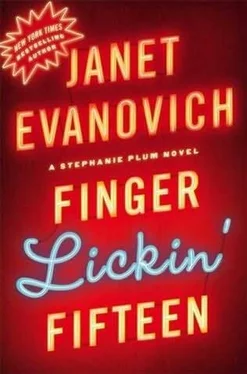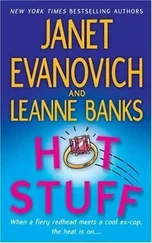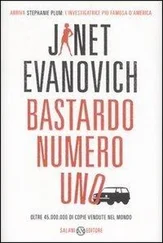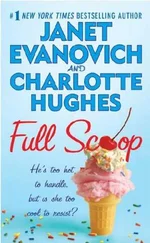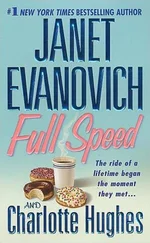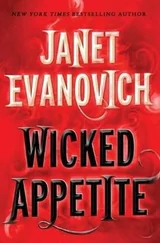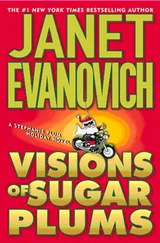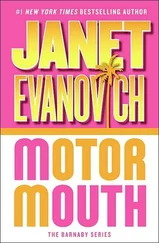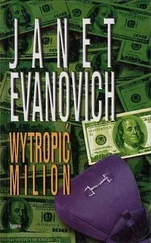“Does that count as an ID?” I asked Morelli.
“Good enough for me.”
“Where do you suppose Marco the Maniac has been keeping the body? It was frozen straight out. That means it was kept in a commercial freezer.”
“There are commercial freezers all over the place.”
“Still, it’s not like Marco and his partner are just hanging out around the house here. They know someone well enough to let them store a dead guy in the freezer.”
“There are probably dead guys in half the commercial freezers in Trenton,” Morelli said.
Lula chugged the whiskey. “This is good stuff,” she said. “I’m feeling much better. Maybe I need just a teensy bit more.”
Morelli got the bottle off the counter and poured out more for Lula. He draped an arm across my shoulders and brought me into the hallway.
“She’s going to be in no shape to talk to the reporters,” he said. “You’re going to have to drive her directly home.”
“Gotcha.”
He leaned in to me. “I could have whispered that in your ear in the kitchen, but I thought this was more romantic.”
“You think this is romantic?”
“No, but it’s all I’ve got,” Morelli said. “This is the highlight of my week.”
“I thought you were dating Joyce.”
“If I was dating Joyce, I’d have fang marks in my neck and I’d be down a couple quarts of blood.”
“Not to change the subject, but why would Marco take a chance by coming out and dropping the body off on the porch? Why not throw it in the river, or bury it, or make it into hamburger? He’s a butcher, right?”
“Good question. Of course, he’s known as Marco the Maniac, so this might not have been a rational act.” Morelli kissed me just above the collar of my T-shirt. “Do you think we can overlook the fact that we’re in a funeral home for a moment?”
“No. For one thing, Gazarra is trying to get your attention.”
Gazarra was waving from the front door. “Can the ME take over?” Gazarra hollered.
“Yes,” Morelli said. “I’m done with Chipotle for now.”
“I’m going to get the cab,” I told Morelli. “I’ll bring it around to the front door, and you can hustle Lula into it.”
I got the key from Lula’s purse and jogged to the lot. My father’s cab was white with CAB printed in red all over it. CAB was an acronym for a small company named Capitol Area Buslettes.
I got into the cab, cranked it over, and drove out of the lot. I stopped in front of the funeral home, and an elderly man got in the backseat.
“Excuse me,” I said. “I’m off duty.”
“Two Hundred Eldridge Road,” he said. “It’s one of the new high-rises down by the river.”
“This is a private cab. You have to get out.”
“But I called for a cab. And now here you are.”
“You didn’t call for my cab.”
Morelli and Gazarra had their arms locked across Lula’s back. They whisked her down the stairs and across the sidewalk without her feet touching once. They came up to the cab parked at the curb and looked inside.
“What’s going on?” Morelli wanted to know.
“He thinks I’m driving a cab.”
“Cupcake,” Morelli said, “you are driving a cab.”
“Yes, but… oh hell, just dump Lula in with him.” Morelli stuffed Lula into the backseat with the man, leaned through the driver’s side window and kissed me, and waved me away.
“Who’s this?” Lula asked.
“I’m Wesley,” the man said. “You can call me Wesley.”
“How come I’m in a cab with you?”
“I don’t know,” Wesley said. “This is a very strange cab company.”
“Hunh,” Lula said.
She slumped in her seat, put her head on Wesley’s shoulder, and fell asleep. Fifteen minutes later, I dropped Wesley at 200 Eldridge Road.
“How much do I owe you?” he asked.
“I don’t know,” I said. “It’s free.”
“Thanks,” he said, giving me a dollar. “Here’s a tip.”
I turned around and drove Lula to my parents’ house. I made sure she got in the house and up the stairs, and then I drove to Rangeman. I parked the cab next to the Buick and took the elevator to the seventh floor. I looked in at Rex and said hello. Someone had given him fresh water and filled his food dish with nuts and vegetables and what looked like a tiny piece of pizza. I went to the bedroom, dropped my clothes on the floor, and crawled into bed.
I was just coming awake when a warm body slipped into bed next to me.
“What time is it?” I asked him.
“A little after seven A.M.”
He threw an arm and a leg over me and nuzzled my neck.
“I have just enough energy left to make both of us happy,” he said.
He kissed my shoulder and the pulse point in my neck. He got to my mouth and my cell phone rang.
“Ignore it,” he said.
It kept ringing.
“I can’t ignore it,” I told him. “I can’t concentrate.”
“Babe, I’m going to be so good to you, you won’t need to concentrate.”
I snatched at the phone. “What?”
It was my father. “You’ve got the cab, and I’m supposed to pick up Melvin Miklowski at seven-thirty.”
“Use Mom’s car.”
“I can’t use her car. I have to have the cab. And anyway, she’s at Mass.”
“Have the company send another cab.”
“There are no other cabs. Everyone has morning pickups. That’s what we do. We take people to the train station. For three years, I’ve taken Melvin Miklowski to the train station precisely at seven-thirty, every Tuesday. He has a Tuesday meeting in New York, and he catches the train at eight A.M. He counts on me. He’s a regular.”
“I’m all the way across town at Rangeman.”
“Then you can pick him up. He’s downtown at 365 Front Street.”
“Okay. Fine.”
I hung up and blew out a sigh.
“That doesn’t sound good,” Ranger said.
“It was my dad.”
“Heart attack?”
“Cab pickup.”
I GOT TO 365 Front Street with five minutes to spare. At 7:30, Melvin exited his house and quickly walked to the cab.
“I’m Frank’s daughter,” I told him. “My father couldn’t make it.”
“Do you drive a cab for a living, too?”
“No. I’m a bounty hunter.”
“Like on television.”
“Yeah.” It wasn’t at all like on television, but it was easier to go with it. Besides, people were always disappointed when I told them what I did every day.
“Are you packin’?” Melvin asked.
“No. Are you?”
“It would be cool if you were packin’. It would make a better story.”
“You could pretend,” I said. “Who would know?”
“Do you at least own a gun?”
“Yeah. I have a Smith amp; Wesson.”
“Have you ever shot anyone?”
“No.” That was a fib, too, but shooting someone isn’t something you brag about.
“What do I owe you?” Melvin said when I dropped him at the train station.
“I don’t know,” I told him. “I don’t know how to work the meter. You can settle with my father next week.”
I’d rushed out of Rangeman without breakfast, and now I had some choices. I could return to Rangeman, I could go to Cluck-in-a-Bucket, or I could get my mom to make pancakes. My mom won by a mile.
I drove to Hamilton and cut into the Burg. I reached my parents’ house and had lots of parking choices. The Buick wasn’t there. Lula’s Firebird wasn’t there. And I was in the cab.
Lula was at my mother’s small kitchen table when I walked in. She was drinking coffee, and she looked like she was at death’s door.
“That was an upsetting experience last night,” she said. “Police identifications give me a headache.”
Читать дальше
